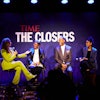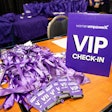Event planner burnout is a common problem within the industry, but it is possible to put on a successful event without crossing into exhaustion. A few tips on how to avoid it:
1. Only take on work from your ideal client.
Whether you’re an independent or in-house event coordinator, your ideal client is the one whose events get your engines running. You get excited to work with them and know exactly how to accomplish their goals.
Independent planners should turn away any potential client who doesn’t fit into your idea of an ideal client. Kindly explain to them that you aren’t the right fit and provide a reference to another planner who may be better suited.
For in-house planners, respectfully decline to help anyone who is looking for event advice or assistance. (Note this excludes immediate stakeholders or those in your chain of command.) While a colleague may want to pick your brain about an event they’re working on, little side conversations can eat up time that should be spent focused on your own projects.
2. Stick to regular office hours.
When you have regular working hours each day, you become more productive during that time because you know the end of the day will be just that—the end. Leave your computer at your office, don’t answer work emails on your cellphone and take the evening to relax. This mental break each day will allow your brain to rest and come back refreshed the next day, which studies say leads to more productivity. There are exceptions, of course, as overtime is often needed in days leading up to a big event, but these should be exceptions, not rules.
3. Take vacations and minibreaks regularly.
The Europeans have this figured out. They take as much as two months of vacation time each year (one month in the summer alone), and workplace studies show they are more productive compared to Americans who hardly take any vacation and regularly work 12-plus hour days. Depending on your situation, it may not be possible to take a month off at a time, but three-day weekends can be just as restorative. The key is to be away when you are away. Don’t answer work emails or phone calls. To truly come back to the board refreshed and ready to work, your mind and your body need a break.
4. Mix up the vendors you work with at each event.
It’s not uncommon to have a set list of vendors you like to work with and continually go back to with each event. But having a diverse list of preferred vendors across all specialities keeps the creative juices flowing and makes every event seem like a new planning experience.
5. Don’t overcommit yourself to networking or professional development events.
What makes event professionals good at our jobs is we love events. That love can often extend to not being able to turn down any networking, social or professional development opportunity. Industry networking events tie back into work, so you are never fully relaxed like you would be if you went out to dinner with your family. Over time, these events start to weigh on you and can lead to burnout with the industry as a whole.
Keep your passion for events alive for the long haul by knowing when to say no and when to pass the lead to someone else. Make time for yourself and you’ll bring more to the table in your role.
Channing Muller is the principal and founder of DCM Communications, a marketing consulting firm based out of Washington, D.C. With more than 15 years of experience in marketing, advertising, magazine editorial and business development, she works with event professionals to grow and scale their businesses through one-on-one and group coaching.















